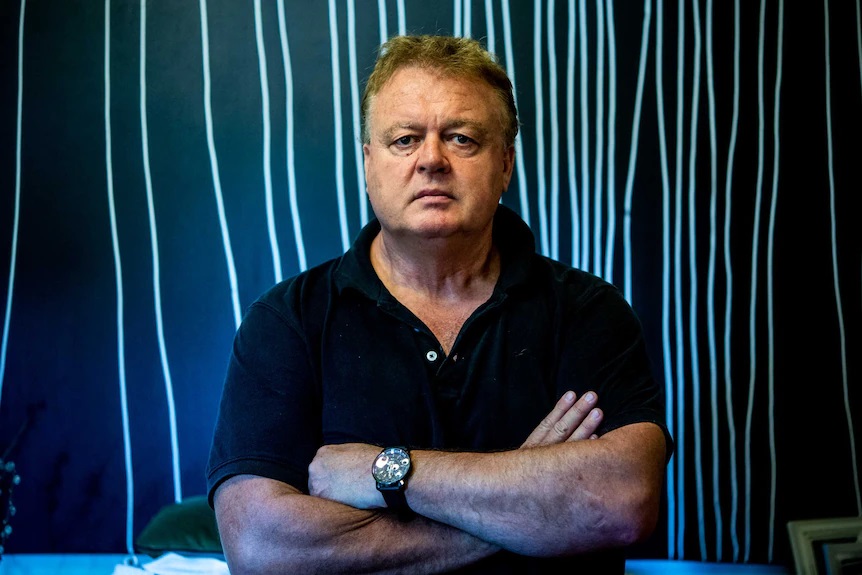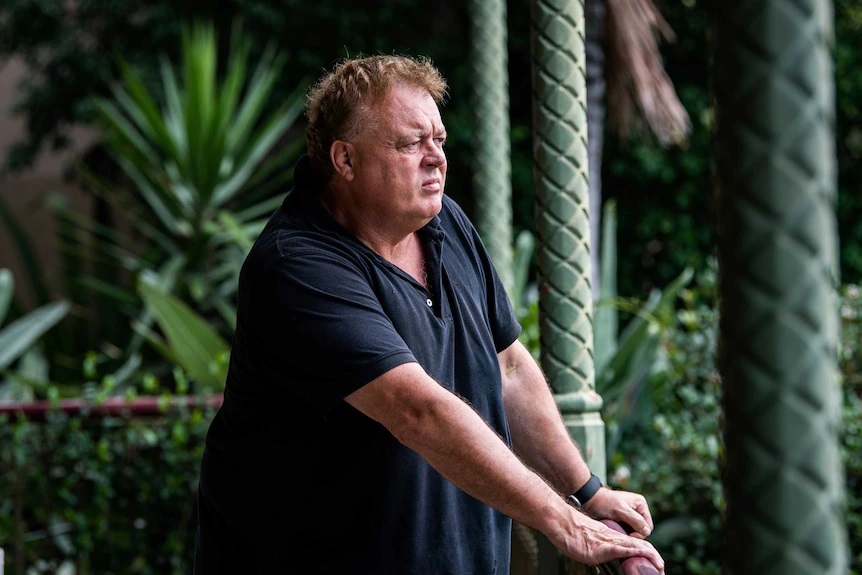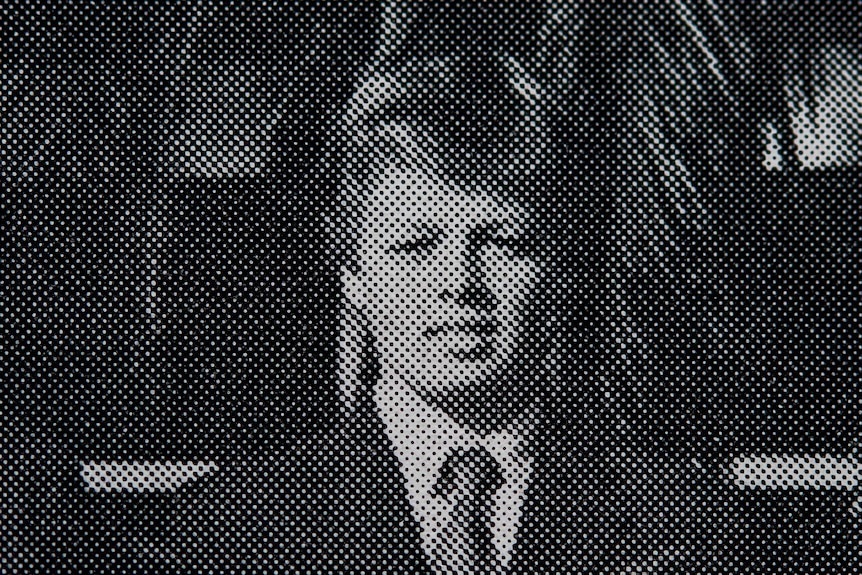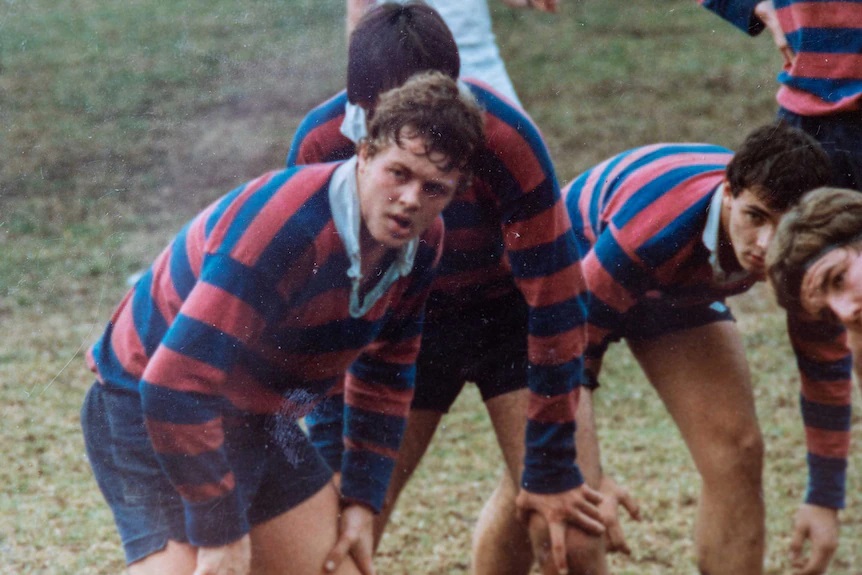(AUSTRALIA)
Australian Broadcasting Corporation - ABC [Sydney, Australia]
March 6, 2021
By David Mark
“I can acknowledge it and I accept the ramification. But I won’t accept that I was a 10, 11-year-old boy and I was walking into an ambush. It shouldn’t have happened.”
There are small moments around which our lives turn. A chance encounter, a diagnosis, a shared connection.
The defining moment in Tony Daly’s life happened when he was just 11.
The man who he claims sexually abused him was a Catholic brother at his new boarding school.
He’d just been sent to St Joseph’s in Sydney — better known as Joeys — one of Australia’s biggest and most prestigious Catholic boys’ schools, a virtual rugby union factory, famous for pumping out future Wallabies.
Tony Daly was one of them. He reached the highest of highs, achieving a lifelong ambition to represent his country.
He played 41 Tests and scored the winning and only try in Australia’s 1991 World Cup final victory over England.
He was on top of the world.
But just a few years later, it all began to spiral out of control.
Dropped from the Wallabies, failed marriages, alcohol, drug and gambling abuse, petty crimes, driving offences, court convictions, a warrant for his arrest and a front-page headline letting the whole world know when he was at his lowest point and least able to deal with the consequences.
Now, Tony Daly is ready to tell his story about the sexual abuse that he says happened when he was just 11 and how that shaped the rest of his life.
On his terms.
“It’s had a grounding or a paving the way for everything in my life. Everything. Everything. The successes and failures, it’s all got to do with that, without question.”
A life-defining moment
It was a happy childhood, but by no means conventional.
“Dad was in the hotel industry with his father”, a “true old publican,” Daly says of his father, John.
The family lived on top of the famous Como Hotel in Sydney’s Sutherland Shire at a time when pub life could be brutal, violence was commonplace and the drinking, extreme.
They’d stay up there till all hours of night and yeah, there’d be blood on the floor most Sunday nights,” Daly says.
John was strict and tough from a strict and tough Catholic family — one where the children were seen and not heard. Some of that thinking and certainly traditions were passed down. Daly describes his upbringing as being strongly Catholic, complete with mass and confession every Sunday.
His father went to the Marist Brothers school, St Joseph’s in Sydney’s Hunters Hill, along with Daly’s uncles and all of his cousins.
“It’s been quite a family, you know, tradition, being at St Joseph’s College,” Daly says.

And so, just 10, shy, with a big mop of curly hair and, as he describes it, “chubby”, Tony Daly was packed off to a very different world of old sandstone towers, Catholic priests and bullying on the other side of the city.
“It was quite intimidating and scary. Because you know, you’re only a young kid, and living with 930 other blokes under the same roof.”
And if you don’t fit in, watch out, because there’s nowhere to hide. Daly was teased and bullied incessantly.
“I was a bit of a chubby kid when I started, you know. I got a bit of a hard time.”
His nickname was “Beachball.”
One Catholic brother offered some respite from the bullying in the first few weeks that Daly spent at Joeys.

“The other brothers, they were too busy looking after 90 out of 95 other kids in the form. So, you know, he was kind to me, he was nice. Yeah.”
“I got ‘Beachball this and that’ and ‘look at you’ and he goes, ‘If you don’t want to get teased you can come in.'”
The pretext was kindness, but in reality, it was classic grooming.
“He was making me feel confident and happy within myself because he was being nice to me, because I was getting a bit of a hard time and any friend will do,” Daly says.
But once behind closed doors the brother stripped down to his singlet and started fondling Daly’s hair and face, calling him a “beautiful boy”.

That’s when the sexual abuse began.
“Second time he started something, but well and truly into it by the third.”
Circumstances demanded that he saw the brother regularly.
Each visit meant another bout of sexual abuse and the pain that followed.
But how does a boy, who’s just turned 11, make sense of a man touching him where he shouldn’t have been touched, or making him do things that no child should do?
It was confusing: Here was a brother, who was being a friend, who was protecting him from the boys who were bullying him, offering him kindness.
But it was uncomfortable. It hurt.
“It felt a little awkward and weird. But I thought well, this is the way things are, if that makes sense,” Daly says.
Going to the sick bay was too embarrassing and so he kept it to himself and told no-one.
“I was 10 or 11, I really didn’t have an understanding and an opinion of anything. I just did as I was told because I was 11 and brother told me to do that, so, I did it,” he says.

“There’s nothing complicated about it. It’s as simple as that.”
Daly says he was abused maybe a dozen times over two years.
But as he entered puberty in year 9, the brother lost interest, while at the same time, Daly began to realise he was interested in girls.
The penny dropped. That wasn’t normal — friends don’t repeatedly sexually abuse you.
“You develop your sexuality, and you start switching on from a 10-year-old to a 14-year-old, you’re starting to realise that hang on, something’s different here. And I’m thinking ‘Crikey, I wasn’t supposed to be doing that sort of stuff,'” Daly says.
“Then you start thinking, Oh, God, I’ve been had.”
He felt, stupid, ashamed, angry, guilty, depressed.
Using rugby to forget
Sport was his saving grace at a school that valued rugby union as second only to God, and now he threw everything into it.
“Although I was also a fat kid, I was very fast. I was a good footballer,” he says.
He hit the gym and trained relentlessly.
“I knew if I was going to be better than anyone else, I had to be stronger and faster. And I pretty much was.”
By the time he was 17 he was 100 kilos but could still run 100 metres in just a little over 11 seconds.
“And I ended up playing for the First XV. I never got a hard time after that, I started knocking people out and breaking legs and collarbones,” Daly says.
“I had a gift.”
Rugby allowed him to excel at something, but also push down the abuse — to forget.
“I’d go for a run every morning, I hit the gym, I’d always train, be going for runs,” he says.
Exhaustion was the goal. If he didn’t train hard enough, he’d lie awake in bed thinking about the abuse.
“Something was driving me, just not the fact that I just wanted to play for Australia,” Daly says.
The trauma remained a deeply hidden secret. He told no-one. After years of constant bullying and despite his realisation that he was attracted to girls, he lived in fear that if anyone found out he’d be accused of homosexuality, which in early 1980s Australia was among the worst insults imaginable.
But the constant training and gym sessions paid off for Daly who managed to suppress the memories of the abuse while excelling on the football field.
By the time he finished school in 1984, he was doing 1,000 push-ups a day, lifting weights, training constantly and working as a bouncer, cellarman and barman at one of his father’s pubs.
Rugby became everything to Tony Daly.
“It was the cornerstone of a life that gave me all the success. And it was the cornerstone for something that I could motivate to after what happened at school.
“So, I identified it as my life, my core, my heart.”
Before long, Wallabies coach Bob Dwyer got wind of the young prop who could run as fast as a backrower.
And so, Tony Daly became just the second person to get picked for the Wallabies without first playing for their state.
It was 1989, Daly was 23 and he was about to face the toughest test in rugby union — playing against the All Blacks at their home fortress in Auckland.
“They called it ‘a baptism of fire’, you know. We’re looking at the haka and I’m going what the … am I doing here? I can’t even remember the game,” he remembers, laughing.
“But look, I must have done all right, I was there for 40 more Tests.”
By the time 1991 rolled around, Dwyer had constructed a squad of youth and experience ready to take on the world at that year’s World Cup in England.
The future Australian captain, John Eales, first met Daly at a training camp early that year.
“If ‘Dales’ is in the room you know he’s there,” Eales says.
“He was always very funny, great sense of humour and could easily make people laugh. And he was an incredibly talented rugby player as well — his natural skills, athleticism and strength, were great, great assets for him.”
Australia made it through the competition undefeated before playing England in the final.
With just a three-point lead, the Wallabies secured a lineout just 5 metres from the English line, with a try beckoning.
Tony Daly takes up the story.
“I’ve come around and my old mate, Ewen McKenzie lagged in on the end of it and we both went over at the same time.”
The commentators are confused, calling the try for McKenzie, but the record books were written differently.
“The referee said that I had the ball from the start of the lineout, and I had it from start to finish, so he gave it to me,” Daly says.
Australia went on to win their first World Cup by 12 points to 6. Daly’s try was the only one of the match.
After the game, the rugged prop was fourth in line to hold up the World Cup and then receive his winners’ medallion and daintily shake hands with the Queen.
“She says ‘nice shirt’. I said yeah, ‘nice coat’,” he remembers, laughing.
Tony Daly was at the pinnacle of his sport: the scorer of the winning try in the World Cup final, a pivotal member of the best team in the world.
He was living the life he’d always dreamed of, representing his country in the sport he loved surrounded by his best mates.
But while the success and camaraderie of his rugby family had helped to suppress the memories of his sexual abuse, it had never completely gone — rather it was lying, quietly dormant.
“There was always some feeling inside me that was always on pause, it was in remission until it came out again,” he says.
Things started to fall apart four years later when he was dropped from his beloved Wallabies during the 1995 World Cup.
It was a crushing and bitter blow.
On a downward spiral
Daly’s identity was gone and along with it the support around him, the membership of a team, a community, and the status of belonging to a privileged club — the Wallabies.
“You know, we’d succeeded, and all of a sudden it was taken away from me,” he says.
“You have your regrets and grieving when you do get dropped — because that meant a lot to me, and I was there for a long time.”
Without the distraction of rugby and success, the abuse that he’d been able to suppress came bubbling up to the surface.
By his early 30s he began to spiral: He was drinking heavily, often till he passed out, waking to find a full beer in his hand.
The goal was getting drunk enough to forget the abuse, but when he was drunk, he’d sometimes commit petty thefts.
If it wasn’t booze it was drugs — or both.
He lost his licence but kept driving.
He gambled, businesses failed, and he was declared bankrupt.
Two marriages fell apart.
“I was going out excessively, sadly. Probably going out to different parties with different friends, you know, probably divulging too much in the drinking sense, and in other areas.”
“You’re depressed enough about things that are happening, let alone depressed enough about what’s happened in your past.
“And people are going, ‘What’s going on with Dales? What’s he doing?’ And no-one knew.
“I just wish I’d just announced it to get help. But I couldn’t, I didn’t know how.”
Still, he didn’t tell anyone, and yet all he had to do was ask.
The support was there, but his teammates, like John Eales, had no idea.
“I remember reaching out to him at one stage, he didn’t seem that keen to be in touch necessarily,” Eales says.
“Unfortunately, I was very unaware of a lot of what was going on behind the scenes.”
Tony Daly’s crimes started piling up — petty theft, and six counts of driving whilst disqualified, which is a jailable offence in New South Wales where he lived.
There were court dates over eight years, but he never showed up. He says he didn’t know how to handle it and so he avoided it altogether. In his absence he was given suspended sentences, bonds, community service and weekend detention.
“I was dodging bullets, sidestepping landmines,” he says.
‘The damage is done’
Tony Daly doesn’t cry when he talks about the abuse that occurred to him when he was just 11, he recounts it matter-of-factly. It was the catalyst for so many of his actions later in his life, but it wasn’t his fault, and it wasn’t within his control.
But when he recounts the destruction of his personal life in his 30s and 40s the sense of shame is palpable and it’s then he has to wipe away a tear; has to pause.
“You get angry about what you’ve done. Because, you know, you just let yourself down.”
And others.
“I’ve gone to apologise to the people, but you know, the damage is done,” Daly says.
“There’s a difference between a reason and an excuse. But when you drink too much is sometimes when you do things you don’t remember. And I’m a classic for it, you know.”
Eventually, in 2015, a warrant was issued for his arrest on driving whilst disqualified charges and he was tracked down at a rugby function at a swank Sydney bar.
“They knew I was gonna be there. The guy came up, he said, ‘We’re here for you. We can either do this the easy way or the hard way,'” Daly recounts.
“I said, ‘I’ll follow you to the lift, officer.'”
It wasn’t the lowest point, but the arrest forced Daly to take stock of his life.
Shortly after, he made a significant step forward when his former Wallaby captain, Nick Farr-Jones, put him in touch with a Sydney respiratory doctor who specialised in sleep disorders and had worked extensively with returned soldiers suffering trauma.
“And he met me within five seconds. He says, ‘You got something to tell me. Something happened with you didn’t it? Where did it happen? School?’
“I’m sitting there going ‘f***ing hell, who is this bloke?’ And he was spot on.”
It was then, almost 40 years after a Catholic brother at St Joseph’s College sexually abused him, he finally told someone for the first time.
He was diagnosed with PTSD and put on medication.
But that didn’t solve things with the judge who was hearing his driving whilst disqualified case in 2017 and who was looking at sending Daly to jail.
Daly recalls a meeting with the judge in a private room: “He said, “Listen, you need to give me something because I’ve got nowhere to go, but incarceration. What’s going on with you?’
“I said, “Look judge, I got abused when I was at school.’
“And he said, ‘I f***ing knew it, you were a Joeys boy, weren’t you?’
“I said, ‘Yeah.’
“He said, ‘I knew it. I knew there was something going on here.'”
He was given 500 hours of community service and banned from driving.
But the greater penalty was when his admission about his abuse was splashed over the front page of a Sydney newspaper two days later.
He claims he didn’t realise a conversation he’d had with a journalist would appear in the press and was blindsided by the sudden coverage of what had been a deeply held and private secret at the lowest point of his life.
“I felt genuinely sorry for him,” says John Eales as he recounts reading the news.
“I think the first feeling and probably the predominant feeling is sadness, because you think no-one should experience that. There’s nothing more abhorrent than someone being offended against and paedophilia.”
Eales says he had a great experience growing up in a Catholic family and going to a Catholic school.
“But to hear that some people, not only didn’t have that experience, but had an experience that was so atrocious and so potentially harmful, is really sad.”
And of course, it wasn’t an isolated event.
At the same time Daly faced court, the nation was transfixed and horrified by testimony provided by victims to the Royal Commission into Institutional Responses to Child Sexual Abuse.
Daly told his story in a private session with royal commissioner Justice Peter McClellan — one of many victims who told the commissioner they suffered abuse while under the care of Catholic institutions.
Eales and Daly now meet every few months for breakfast — the former captain is one of a group of Wallabies who have rallied around Daly.
“I think he is very much more aware of his actions and how they affect others, perhaps, and I think he’s taking responsibility for a lot of his own behaviours,” Eales says.
Regarding the sexual abuse, Eales stresses that Daly understands it was not his fault.
“This was abuse from someone on him, not because of him and I think that is an important realisation that he has got to,” Eales says.
But that realisation has taken a long time.
“It’s been a long, four or five years of rehabilitation. I had to go through a pile of shit to come out squeaky clean at the end, if that makes sense.
“My behaviour — particularly in the stuff with the alcohol and other things — it’s copybook of behaviour of an abused person, whether it’s sexually abused, or abuse comes in different ways. But the results are the same. Because it plays on you mentally — PTSD and depression and anxiety and stuff like that,” Daly says.
A great deal of that understanding has come from Daly’s involvement in the Survivors and Mates Support Network (SAMSN).
“Disclosing can be an incredibly painful experience for people, but it can also be incredibly freeing to speak your truth. To be heard to be believed, and hopefully understood, is huge for people,” the group’s CEO Craig Hughes-Cashmore says.
“Carrying that kind of secret is exhausting.”
And yet so many do, sometimes for their entire lives.
On average it takes women 20.6 years to reveal childhood sexual abuse. For men, it’s 25.6 years.
Around 33 to 40 per cent of child sexual assault victims who report their abuse are male.
But the royal commission found ideas around masculinity and homosexuality could discourage men from reporting their sexual assaults.
“If men have a same-sex perpetrator, questions about their own sexuality and what that means is often confusing for them,” says Hughes-Cashmore.
Daly says SAMSN has helped him understand his abuse.
“You know, you’re not the only one that’s been through it, and that gives you comfort,” Daly says.
But what Tony Daly wants more than anything is for St Joseph’s to acknowledge he was sexually assaulted.
“I want them to see what’s happened and how it’s affected my life,” he says.
“The rollercoaster ride. How I’ve failed personally and in business.”
Daly knows he’s not the only one who’s been abused by Catholic brothers at the St Joseph’s College.
“I’ve had so many people approach me from Joey’s saying it happened to me too, and three of them were by the bloke that got me.”
A former St Joseph’s dorm master, John Maguire, was sentenced in 2015 for sexually assaulting an 11-year-old student in 1983.
In the court were a number of former St Joseph’s students who had gone to the police complaining of sexual abuse by Maguire, but whose cases couldn’t be proven.
Maguire was not the man who Daly says sexually abused him.
Other former St Joseph’s boys have begun legal actions against the school over sexual abuse, and settled out of court.
Now, Tony Daly has begun his own legal action. He’s seeking damages from the school’s owner, Marist Brothers.
“I can acknowledge it and I accept the ramifications,” he says.
“But I won’t accept that I was a 10, 11 year-old boy and I was walking into an ambush. It shouldn’t have happened.”
His lawyer Adair Donaldson says Daly has no interest in “engaging with the perpetrator.”
“For him, the school has the ultimate culpability. Schools owe the highest duty of care to children whose parents entrust their welfare to them. Tony hopes by holding the school accountable it forces it to be ever vigilant in keeping its students safe,” Mr Donaldson says.
In a statement, the Marist Brothers Province of Australia said it wouldn’t comment on Daly’s specific case.
The statement went on: “The Marist Brothers, openly acknowledge that children have been failed by those charged with their care and protection.”
“Our apology for this and the harm caused as a result, is unreserved, enduring and a matter of public record.”
Moving forward
Part of Daly’s recovery involves speaking out publicly for the first time in 43 years about his experiences.
“I think there’s a time and a place for everything,” he says.
“I had to get better. I had to go to SAMSN. I had to get on medication. I had to get involved in things that were normal.”
“And you know, I just want to get out there and tell the Joeys kids, and other kids for that matter, that you need to identify and announce it.
“You’ll spiral, it’s inevitable, you won’t stop, you can’t, you need help. And it’s the fear of not being too frightened to ask for help, no matter who you are, whatever you’ve achieved. That’s the key.”
SAMSN’s Hughes-Cashmore describes Daly’s public statements as “awesome.”
“Tony is so brave to do this. And if his voice cuts through because of his profile then that’s a really good thing.”
Daly says life is going well despite some “bumps and bruises” along the way.
He’s working regularly as a safety consultant with a large building contractor and slowly building up his self-confidence, while keeping in close contact with his group of friends.
And what does Tony Daly want now?
“I just want everything to be resolved. And you know, I just want Joey’s to acknowledge what’s happened, and whatever benefit I may have from that so be it,” he says.
“I just want to be balanced.
“I’ve lost a lot, mate.
“You know, is that supposed to be hunky dory in the Joeys’ family? Oh, don’t worry, she’ll be right mate. Deal with it. Get over it. Have another beer. Score another try.
“Times have changed.”
